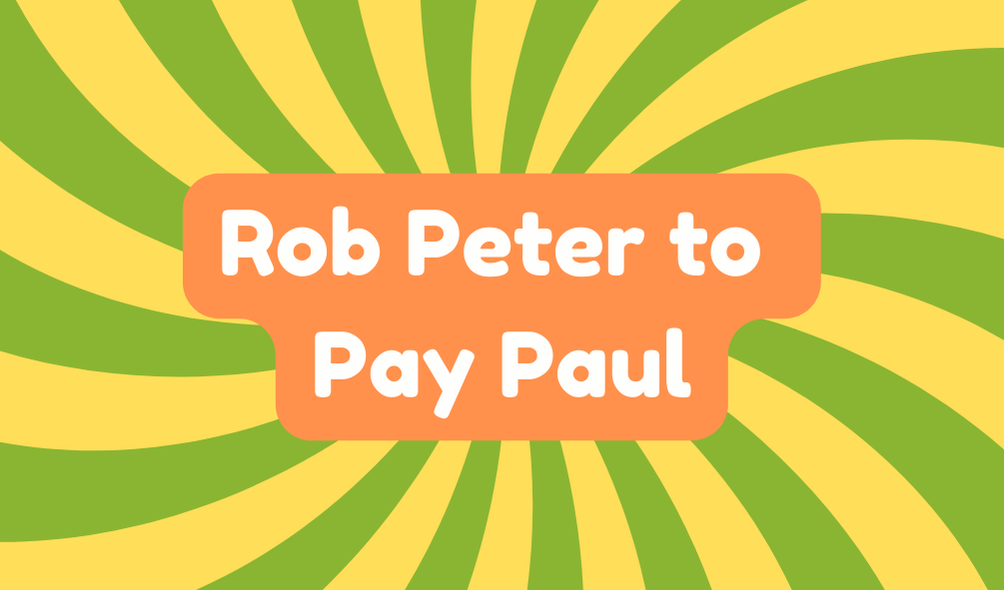When you hear "rob Peter to pay Paul," it usually refers to shifting debts around instead of addressing your financial problems. For instance, if you borrow money from one source to pay off another, you're stuck in a cycle that often leads to more chaos. This approach points to poor long-term planning and can keep you on a financial treadmill. Historically, the phrase highlights ethics in money management, showing that temporary fixes rarely solve deeper issues. If you want to break this cycle, you'll need to rethink how you handle your finances and make wiser choices to achieve stability.
Synonyms
When exploring synonyms for the phrase "rob Peter to pay Paul," you'll find several expressions that convey similar meanings. These terms reflect the pitfalls of short-sighted financial strategies and the complex nature of resource allocation. Here are a few synonyms that capture this essence:
- Shift funds
- Ponzi scheme
- Juggling debts
- Transfer troubles
- Financial treadmill
Each of these phrases signals the dangers inherent in prioritizing one obligation over another, often leading to prolonged instability. It's important to recognize that these practices may temporarily resolve issues but can ultimately exacerbate financial distress. By understanding and avoiding such terminology, you can foster better decision-making and more sustainable financial habits. After all, awareness is the first step to ensuring responsible resource allocation.
Example of Sentences
Examples of sentences can help illustrate the phrase "rob Peter to pay Paul" in various contexts, making its meaning clearer. This phrase often highlights the financial pitfalls inherent in poor money management and the resulting debt cycles. Here are some situations that exemplify the idea:
- Transferring funds from your savings to settle a credit card bill.
- Borrowing cash from one friend to pay another.
- Using payday loans to pay existing debts, leading to more trouble.
- Shifting budget allocations to cover unexpected expenses without a plan.
- Choosing short-term loans as a fix, only to face higher interest later.
These examples show how quick fixes can trap you in a loop of financial instability, reminding you to tread carefully in your financial decisions.
Origin
The origins of the phrase "rob Peter to pay Paul" are somewhat murky and debated among linguists. Some link it to the taxes paid to the Church of Saint Peter, as funds allocated for repairs at St. Paul's Cathedral in the 16th century. This historical context shows how financial ethics have evolved, yet the phrase continues to resonate today. It suggests a cycle of reallocating resources without addressing the underlying issue. You may recognize its implications in your own life, as it highlights the pitfalls of quick fixes that ultimately harm another area. By examining this idiom's roots, you gain insight into the persistent challenges of managing finances ethically and effectively, urging a more thoughtful approach to financial decisions.
Collocations
Collocations related to the phrase "rob Peter to pay Paul" often highlight the nuances of financial mismanagement. Understanding these phrases can reveal the depth of financial pitfalls and resource mismanagement. Here are a few key collocations to take into account:
- Juggling debts
- Short-term solutions
- Misguided investments
- Financial instability
- Unsustainable practices
These terms paint a clear picture of the cycle many find themselves in when they prioritize one obligation at the expense of another. It's important to recognize that this approach often leads to deeper financial troubles. By focusing on better budgeting and avoiding quick fixes, you can break free from this cycle. Embracing innovative financial strategies is essential for sustainable growth and long-term stability, steering clear of the common pitfalls.
How to Use in Everyday Language
How can you effectively incorporate the phrase "rob Peter to pay Paul" into everyday conversation? You can start using it in discussions about financial advice or when you see someone making questionable financial choices. For instance, if a friend borrows money from one source to cover another debt, you might say, "Looks like you're robbing Peter to pay Paul." This phrase is perfect for highlighting the pitfalls of shifting funds in everyday situations. It emphasizes the risk of short-term solutions leading to long-term problems. Using it can prompt listeners to think critically about their finances, encouraging smarter budgeting and responsible planning. So, the next time you notice this cycle, don't hesitate to use the phrase—it can spark invaluable conversations!
Why Is It Still Relevant Today?
Financial instability remains a pressing issue for many individuals and organizations today, making the phrase "rob Peter to pay Paul" increasingly relevant. As you navigate your finances, consider how reliance on short-term fixes often reveals a lack of financial literacy. You might find yourself reallocating resources meant for essential needs just to meet immediate obligations, further complicating your financial landscape. This cycle not only strains your budget but can lead to misguided decisions. Understanding resource allocation is vital; without it, you risk falling into the trap of debt and stress. Embracing effective financial management strategies will empower you to break free from harmful habits and create sustainable solutions that strengthen your financial health in the long run.







